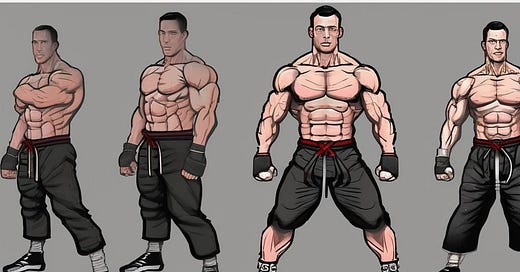You have probably heard someone say in martial arts, that strength doesn’t matter.
It’s true that proper technique, most of the time can be better than muscling any move in martial arts. It can help the martial artist against a strong man with no training in most cases, but when you get a strong man with some training—strength tends to count for a lot.
In this post, I’ll talk about that, how it helps prevent injury, and a question about what muscle is used the most in training from Quora.
Strength vs Technique
I remember hearing throughout my journey in martial arts that strength doesn’t matter.
Most of the time, against someone who knows what they are doing in whatever art they practice, that is true. But if you train with the same people long enough, you will start to notice that something else is required. If two people are just about as good as they are going to be, then speed or strength has to break up the odds.
You can add cardio to that too.
If you watch pro fighters, or even watch any Rocky movie you’ll see that the training they are doing is mostly for muscle memory. To add power or speed to their movement, so that they can have an edge against their opponents. You’ll see them do more strength and conditioning versus technique because they sort of already know everything they need to know about fighting, they just have to be able to do it better than their opponent.
In my work covering combat sports, many athletes I talk to have their coach/instructor for martial arts and a strength and conditioning coach. If you have the time and the means to have both, it would be a wise investment.
As you get older, you might have to make sure you make time to keep your technique sharp, and your muscles strong.
Injury prevention
One of my training partners is about 10 years younger than I am.
He’s fought MMA, done all kinds of grappling competitions, and wrestled when he was in the army. To say he’s got true combat experience would be an understatement. When he began training, he was (in my opinion still is) one of the most athletic practitioners in the room. He was one of the few people I did one long continuous grappling round with (14 minutes) of which he, of course won.
Then he entered his 30s.
Early 30s are the prime years for most athletes, you’ll see many fighters win titles in those years. Once they get past 35 or so, injuries seem to happen more often and they don’t heal as fast as they once did. This is true for most practitioners whether they be active competitors or hobbyists. It’s definitely been true for me, and unfortunately, true for my younger competitive friend.
He picked up an injury, one that nagged him often and had him miss a lot of training. He went to his doctor, who knew that he was an active competitor and the doctor asked, “What else do you do outside of your martial arts training?”
When he told him, that was all he did, his doctor suggested he add a weight regimen to prevent more injuries. Around the same time, Jocko Willink who holds a black belt in Brazilian Jiu-Jitsu and is a former Navy SEAL did an interview somewhere (I don’t recall where) that called lifting weights “injury prevention.”
These days, I try to make time for strength and conditioning on top of my training.
Which Muscle Do BJJ Fighters Use The Most?
My answer to the above question posted on Quora is one of my most read, and most upvoted answers on the platform.
I still stand behind it, I would only add the one most used probably depending on the type of grappler you are. Here’s what I wrote:
Rhadi Ferguson who has a Ph.D. in Physical Education and holds black belts in Judo and Brazilian Jiu-Jitsu once said a grappling session is equivalent to a full body work out and I agree. However, what one uses the most is dependent on the type of grappling they like to do.
Someone mentioned in their answer forearms and such if they are gi grapplers and legs for no gi. But all the muscles truly are engaged because your body is in motion against another person.
If you had to say one muscle I would say your core muscles, or abs since those are the ones constantly engaged regardless of how you train.
If you like this post please share it with anyone else you think it will help. If you are more of an MMA person I have a newsletter for that you can check out here.





